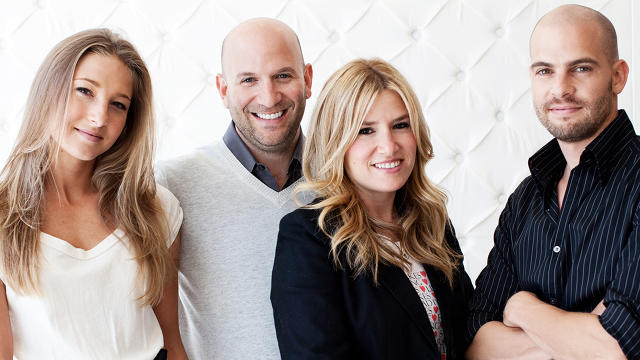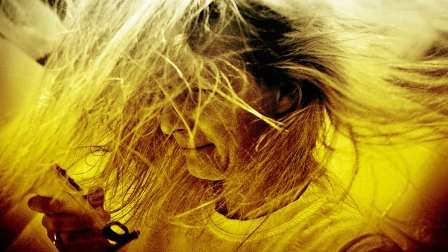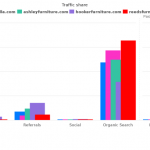Drybar’s Secrets To Blow Out The Competition
When Alli Webb started talking about her idea for Drybar seven years ago, everybody thought she was crazy. On the surface, the concept really doesn’t make much sense. It’s a hair salon, but you don’t actually get a cut or color; all you get is a blow dry. And the whole experience costs you $45. Who would go for that?
“Any investor who looked at our business plan would have thought we were out of our minds,” says Michael Landau, cofounder of Drybar with his sister Alli and her husband Cameron Webb in 2008. “I know this because I went to a lot of savvy VC and private equity friends, and they laughed in our faces.”
They’re not laughing any more. Six years since launching during the recession, Drybar now generates close to $100 million in annual revenue, has a staff of 3,000, and will have 70 locations across the country by the end of the year. This translates to millions of blowouts.

In 2013, it launched a popular product line—including a best-selling $195 hairdryer—available at Sephora, Nordstrom, and Drybar salons. Many of the investors that Landau pitched had to eat their words. Those who saw past the unproven concept have contributed to the tens of millions in funding Drybar has received to continue its trajectory of explosive growth.
Transforming a once-laughable idea into a thriving business came down to family. Alli laid out her plan to her husband, Cameron, and her brother. “We listened to her and believed in her,” Michael says. “We really wanted her to have this business.”
The trio worked hard to execute Alli’s vision. They each brought very different skills to the table, worked long hours, and invested their own money to get Drybar off the ground. Each one believes that much of the company’s success has to do with their family dynamic. Indeed, while family-controlled businesses made up 19% of the companies in the , they tend to outperform companies in which those at the helm aren’t related. McKinsey found that sales by family-run firms grew by 7% a year since 2008, compared to the 6.2% a year growth of non-family firms in the list.
Though their methods might seem strange and unconventional in many other startups, today, Drybar stands out as a striking model for the modern family business. But its founders think many of their strategies would translate easily to other businesses, whether they are run by family members or not.
Find People With Totally Different Skill Sets, Then Trust Them
Looking back, they think that one of the keys to the company’s success is that they each brought very different talents to the mix. While Alli was a trained stylist, Cameron had spent his career as a creative director at a branding agency. He was one of the minds behind the successful Jack in the Box television spots. Michael spent many years working for Yahoo and also had experience as an entrepreneur, when he ran his own real estate business.
At first, none of them quit their day jobs. “We all just moonlighted trying to come up with this brand,” Michael says. “It was all hands on deck. We were all there until 2 a.m. every night. It was complete chaos.”
After long days at the office, Michael would make spreadsheets to determine how many clients they would need to bring in to make the business sustainable. He worked on fundraising and negotiating deals on new locations. Cameron, for his part, thought about what the Drybar brand should represent and how to create an in-store experience that was about more than just getting your hair styled. And Alli had good instincts about what women would want from a salon experience and could train the stylists they hired. Michael says, “All of our skills are so complementary.”
Their collective expertise meant that in the early days, they didn’t have to invest in hiring a team of experts to work for them. They would not have been able to afford to bring on a top design agency to do their branding, but because Cameron was an agency creative director at the time, they got all of his expertise for free.
Without micromanaging one another, the business got off the ground quickly and without hindrances. “When there are differences—which does happen—everybody is comfortable acquiescing to the person who knows that area best,” Alli says. “There is such safety in trusting one another.”
After the first Drybar salon in Brentwood, California, took off, they began to look into expanding into new locations. Before long, Michael and Cameron decided that it would be worth focusing all their attention on the company. “I loved creating the brand and the voice,” says Cameron. “It was the first time that I didn’t have a client telling me what they liked or didn’t like,” he explains. “I was really able to do what I thought we should do. That was really exciting for me.”
Crazy Ideas, When Well-Executed, Might Be Massive Money-Makers
Which brings us to an important part of Drybar’s success: how the idea is executed. They understood early on that the success of the business would depend on creating an elevated experience for the customer. It had to be about more than the blowout—about allowing a woman to feel pampered and cared for.
Cameron spent a long time developing a logo and several design elements, including the iconic Drybar yellow seen throughout the branding. He and Alli designed the stores so they felt like you were going to a fun, relaxing place, much like a bar. They further developed the “bar” concept by creating a “menu” of different hairstyles you could choose from and hair products that were named after different drinks: triple sec, Texas tea, hot toddy, mudslide.
They choose fun, upbeat music to go along with TV screens that show beloved chick flicks like Sixteen Candles and Breakfast at Tiffany’s with the captions on, so women could enjoy them while having their hair blown out. And of course, customers can have complimentary wine or champagne as they are getting their hair done. “We wanted to it to have that local bar feeling where you walked in and people knew you,” Alli says. “I still tell our staff that this is a bar where people can unwind and have fun.”
The founders invested $400,000 to build out the very first store, an astronomical amount by small business standards, paying close attention to detail. They invested in expensive tufted paneled walls that give the space a luxurious feel. Even the bathrooms are carefully designed to be cheery, with cute touches, such as the vintage photographs on the walls. “There are so many little brand touch points that we believe have made Drybar so successful,” Alli says. “The way you’re treated, the way the shop looks, the way your hair feels, even how the place smells.”
Investors may have balked at these design elements because they are not cost-effective and put pressure on the nascent company to generate a high volume of customers to balance its budget. But because they are family, they had the autonomy to go with their gut. In the end, Drybar’s mounting revenues prove all of this attention to detail has paid off. This is why the founders believe that Drybar will continue to be successful, even though there have been a slew of other companies that have tried to imitate their model over the last few years. “There are a lot of copycats out there now, but they can’t replicate the full Drybar experience,” Alli says.
Allow Yourself To Vocally Disagree . . . But Always Make Up
One benefit of the three founders being related is that they are all comfortable—and vocal—when they think things are going in the wrong direction. As family members, they have a lot of personal experience working through disagreements and have applied some of these conflict-management skills to their work. “At the end of the day, you’re still related,” Alli says. “For Cameron and me, we still have to go home together and sleep in the same bed.”
Alli and Michael had previously launched other businesses with friends and have noticed that it is not as easy to be open when problems arise. “You hold back,” Alli says. “There’s a lot of pent-up anxiety, frustration, and resentment that you can’t totally air. I don’t hold back anything with Michael and Cameron,” she adds.
If there’s an issue with operations or a new product that might become a problem down the line, one of the founders will catch it and won’t be afraid to confront it head on, even if it might offend one of the others. Since the Drybar team has grown, there are now many other executives who work under the three of them. They’ve found that even when their subordinates are unwilling to be critical of them, they are willing to be critical of one another, which ensures there are always checks and balances in place.
Alli points out that this kind of dynamic creates a workplace culture that some employees may not be used to. Some investors and leadership hires that they have brought on were initially apprehensive about joining a family business. So they have felt the need to demonstrate that being a family has actually resulted in a warm, supportive workplace culture, and that business operates in a professional way.
But at the same time, there are occasionally sibling squabbles that take place on salon floors. “Michael and I will have an argument as brother and sister that is probably inappropriate to be having in front of the rest of the team,” Alli says. “But it’s funny, too. I think the people that choose to join our team sort of dig it.”
Fast Company , Read Full Story
(38)








